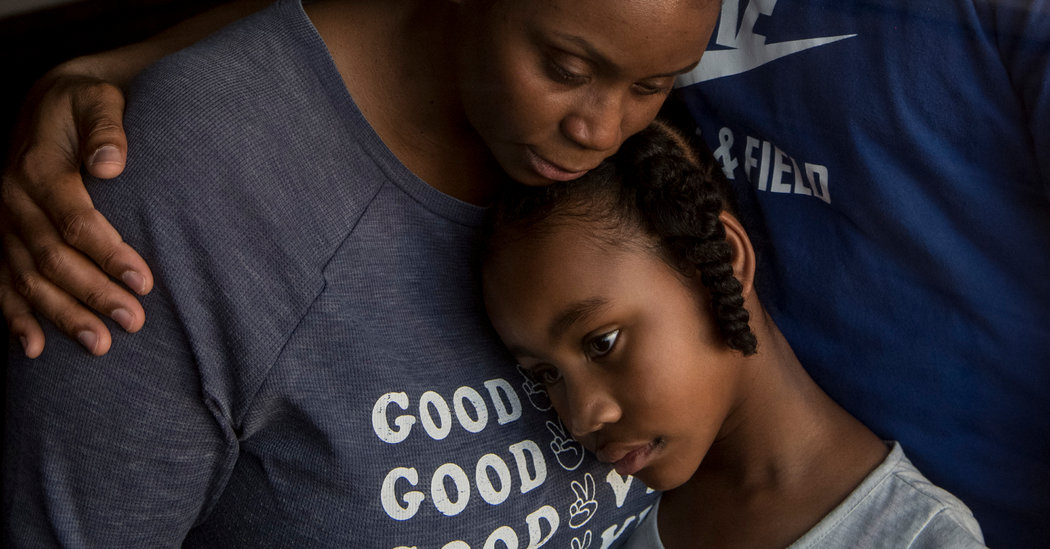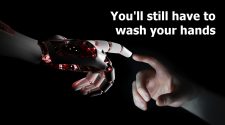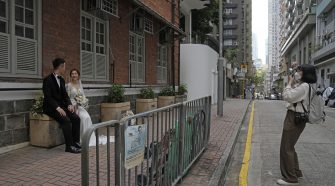When Valicia Anderson starts to count the people she knows in Las Vegas who have lost their jobs, she runs out of fingers fast.
Her husband, the breadwinner of her family and a restaurant worker in the Rio casino. All 25 of his co-workers. Her grown son, in a temp agency. The technician who does her nails. The barber who cuts her husband’s hair. Her best friend, a waitress. The three servers and a manager at the TGI Friday’s that is her family’s favorite treat.
She has to think hard to come up with a single person who is still being paid. So when the events of the past month start to overwhelm her, Mrs. Anderson walks into her bathroom, closes the door, sits at her vanity and takes deep breaths.
“You are pushing people up against a corner,” said Mrs. Anderson. Referring to those in charge of the pandemic response, she added, “They want you to stay home, and you’re doing that, but they’re not helping you financially to keep you afloat while you’re at home.”
She added: “It doesn’t make sense.”
As the bottom fell out of the American economy, few places were hit harder than Las Vegas, where a full one-third of the local economy is in the leisure and hospitality industry, more than in any other major metropolitan area in the country. Most of those jobs cannot be done from home.
Nearly 350,000 people in Nevada have filed for unemployment benefits since the crisis began, the highest number in the history of the state. Applied Analysis, a Las Vegas-based economic research firm, estimates the city’s current jobless rate to be about 25 percent — nearly double what it was during the Great Recession — and rising.
“From an analytical standpoint, this is unprecedented,” said Jeremy Aguero, a principal analyst with the firm. “We have no frame of reference for what we are seeing.”
As governors and mayors across the country wrestle with the question of when and how to reopen their economies, Las Vegas faces particular pressure because of its dependence on tourism and hospitality. Mayor Carolyn Goodman argued last week that casinos should reopen and allow people to get sick, but Gov. Steve Sisolak said the state was “clearly not ready to open.”
Before the crisis, Nevada’s economy was one of the fastest growing in the country. Then, practically overnight, the glittering Vegas strip shut down, throwing thousands of waiters, bartenders, hotel cleaners and casino workers out of work, often without severance or benefits, and leaving the most bustling and storied stretch of the state’s economy boarded up and empty.
“If you were to imagine a horror movie when all the people disappear, that’s what it looks like,” said Larry Scott, the chief operating officer of Three Square, Southern Nevada’s only food bank, describing the Vegas strip. “You can’t imagine that there is a circumstance that could possibly cause that. I couldn’t have.”
The result has been a quiet catastrophe, unfolding in the living rooms of working-class people all across the city. The crush of new claims has all but paralyzed the unemployment office, and some people are now entering their fifth week without income.
Emergency services are straining under the load. People begin to line up in their cars at one of the largest food distribution sites as early as 4 a.m., more than six hours before it opens.
Janette Gutierrez, a patrol officer for Las Vegas Metropolitan Police Department who assists with the food giveaways, said sometimes people wait so long in their cars that the batteries die. She recently gave jump starts to three different cars, so they would not lose their place in line.
Most Americans support stay-at-home restrictions to protect public health. And yet the burden of the country’s shutdown is disproportionately falling on those least prepared to handle it: About 52 percent of low-income Americans say they or someone in their household has experienced job upheaval, compared to 43 percent of the broader adult population, the Pew Research Center found. Only 23 percent of low-income Americans say they have enough emergency funds to last them three months.
In March alone, bars and restaurants cut 417,000 jobs across the country.
Ms. Anderson’s husband, Jovaun Anderson, 34, was one of those workers. He started a job at Guy Fieri’s El Burro Borracho, a restaurant inside the Rio hotel and casino, in 2016. He was one of the workers who brought the food to the table — a food expediter, they called it. He liked the work.
“Kind of like a free-spirit-type job,” said Mr. Anderson. “No one breathing down your neck all the time.”
Ms. Anderson, 45, worked too, mostly at call centers, another staple of the Las Vegas economy. Raised in California, she moved to Las Vegas during high school when her grandparents, who were her legal guardians, decided to retire there.
She switched to part-time after the birth of their daughter, Nylah, in 2012. When Nylah was one, she was diagnosed with developmental disabilities, and at age six with digestive issues, which is when Ms. Anderson quit completely in order to care for her.
When Mr. Anderson was laid off on March 16, he texted his wife. She immediately started to worry. The pharmacy had just sent her a message about refilling her daughter’s medicine. Their car and phone payments were coming up. So was April’s rent.
“We’ve lived in this house for five years and have never, ever had a problem paying rent,” she said. “I’m worried about how we look to the landlord and everything.”
That night they stayed up late, sitting quietly together in their small den looking up the totals of their bills and Googling things like “how much does unemployment pay.” He filed for unemployment right away, as his manager suggested. He even got two payments. But when his last paycheck arrived, it was for more than he expected — a change he had to report to the state. This threw his claim into a netherworld of unhelpful help lines and frozen web pages.
Nylah, now a lively 8-year-old, had been thriving as a special education second-grader. But she is not getting the medicine she needs to help keep her from vomiting, because the Andersons can no longer afford the copay. Her special education classes are proving difficult to pull off on their aging home computer, which is prone to freezing, and Ms. Anderson is worried that her daughter is backsliding. The couple is trying to hide their anxiety from Nylah, but Ms. Anderson says her daughter senses it.
“She was at the door,” Ms. Anderson said, describing one of her sessions regrouping herself in her bathroom. “‘Mommy, are you OK?’”
Since her husband lost his job, Ms. Anderson has spent hours each day scouring Facebook sites where people are discussing their unemployment problems. People take screen shots of their phones: One woman’s screen shot showed hundreds of calls to the unemployment line. Another showed a 9-hour hold time.
The thought of the delay in her husband’s receiving benefits fills her with fury. The state emailed that an “adjudicator” would be assigned, but so far, no one has contacted him, and he has not been able to get through on the phone.
“What questions could you possibly ask,” she said in an exasperated voice. “He lost his job. Everybody did!”
Nevada offers 26 weeks of unemployment insurance and pays a maximum of $469 a week, which falls is in the middle of the pack nationally in the size and distribution of unemployment benefits, according to Michael Leachman, a policy expert at the Center for Budget and Policy Priorities.
But like other states, Nevada has seen its unemployment offices swamped by the sudden surge of claims. The state hired a call-center firm to help. It also updated its website. But it is still trying to dig through the backlog.
“This is an unprecedented volume for us,” said Rosa Mendez, a spokeswoman for the Nevada Department of Employment, Training and Rehabilitation. She said that on one day in March the department received more than 28,000 calls. “We’ve never experienced this in the state’s history.”
The chaos has bred frustration and complaints that Governor Sisolak, a Democrat, has not done enough to try to fix it.
“I know this is hard — I get your frustration, too,” Mr. Sisolak said two weeks ago as he vowed to address the problems.
Shenika Dixon, an unemployed 39-year-old who spends a lot of time on a Facebook group that Ms. Anderson frequents, said of the governor: “He focuses most of his time on Covid and people that have it. But what about all the people that are unemployed and don’t have money for medicine?”
Ms. Dixon said her job at a call center fell through around the time of the shutdown. Bored one day, she started talking to people on the site, since she used to be a social worker.
“People are like, ‘Help me, I have kids, I have no food, I can’t get heart medicine,’” she said, adding that one woman mentioned suicide.
But Ms. Dixon doesn’t agree with Mayor Goodman that the stay-at-home order should be lifted. Opening up is not like flipping a switch, she said. The virus is still out there. And some people won’t have jobs to go back to. Which leads back to the original problem.
“Where’s the money?” she said. “Where’s the money that we were promised? Is it sitting in a bank somewhere growing interest? What happened to it? Why is this so hard?”
Ms. Mendez said the state had paid 173,347 initial claims since March 1 — roughly half the total that had been filed — and that it was working as fast as it could to pay them all.
“We realize and acknowledge how hard it is for people right now,” she said. “We are doing everything we can to alleviate this problem.”
For the Anderson family, the days have a strange suspended quality, but with a low, constant buzz of stress. Ms. Anderson cleans rooms that don’t need it. Mr. Anderson plays video games on his phone. She is sleeping less. He is sleeping more. In the evening, they read the Bible out loud.
“It’s like I have no answer for this right now,” Mr. Anderson said. “I just walk through the house, back and forth, on what to do next. What can I do next, and what can I do to bring our next meal in?”
He has been looking online at jobs with Walmart, Albertsons, a grocery store, and Family Dollar. But he is not sure if he would take one, even if he got it. He is worried about bringing the virus home to his family.
The family tried to go to a food distribution site last week in a parking lot near her daughter’s school, but the line stretched for blocks and her daughter was starting to get anxious, so they decided to try another day.
On Thursday, their kitchen cupboard contained two cans of chicken and rice soup, one can of chili, half a package of Saltine crackers, and five packs of Ramen noodles. The refrigerator had half a gallon of milk, six eggs, and some slices of bread. There was $22 in their bank account and less than a quarter of a tank of gas in their car.
Sometimes in the evenings after dinner, they dance. It gives them some exercise, and seeing Nyala swinging her arms, jumping and laughing makes them happy.
“I feel like I can live anywhere,” Ms. Anderson said. “I’m sure my husband feels the same way. Like we can go sleep in a car, in a parking lot. But I can’t have that for my daughter. She has to have food, medicine and a roof over her head at all times. So my fight, my battle is for her.”

















